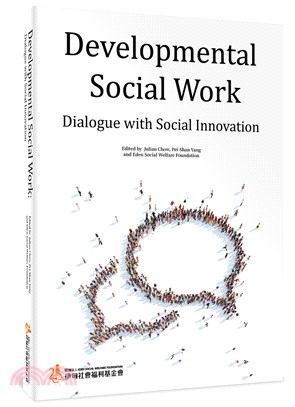再享89折,單本省下172元
商品簡介
Since 2015, Eden Social Welfare Foundation has collaborated with the Department of Social Work of National Taiwan University to hold three international conferences regarding developmental social work. We published two conference proceedings Developmental Social Work: Theory and Practice and Developmental Social Work: Advancing Policy and Practice.
This book focuses on the theme of “social innovation” and contains various innovative ongoing cases of developmental social work. It also compiles lecture and forum notes to share the concepts, practices, and dialogues of developmental social work, helping readers develop a broader and deeper innovative thinking.
作者簡介
Julian Chow
Educational Background: Doctorate degree in Social Welfare, Case Western Reserve University, USA
Experience: Hutto-Patterson Charitable Foundation Professor, School of Social Welfare, University of California, Berkeley, USA
Areas of Specialization: Community Practice; Social Service Delivery; Community Analysis; Needs Assessment
Pei-Shan Yang
Educational Background: Doctorate degree in School of Social Work, Columbia University, USA
Experience: Chairman of Department of Social Work, National Taiwan University, Taiwan
Areas of Specialization: Long-term care, Senior Citizens Welfare, Qualitative Research, Social Work Integration Service Model, Dementia Friendly Communities
Eden Social Welfare Foundation
Ms. Liu Hsia, a female wheelchair writer suffering from rheumatic arthritis, witnessed the discrimination against persons with disabilities in Taiwan. In response to God's calling and with a great love for the persons with physical and mental disabilities, she decided to create a place where the disabled are truly cared for and loved - The Garden of Eden in Dreams. On December 1, 1982, she donated her income from publishing and initiated a group of Christians who shared her vision to bring persons with disabilities as well as other socially marginalized group. Eden Social Welfare Foundation was founded to serve persons with disabilities as well as other socially marginalized groups.
序
Preface
Eden Social Welfare Foundation first held the International Symposiumon “Developmental Social Work: Theory and Practices” in 2014. Back then theconcept of “Developmental Social Work” was a groundbreaking initiative whichhas drawn immense attentions. In 2016, it was held once again with the theme of“Global Application, Dialogue Development “, followed by the third internationalconference when it proposed the theme of “Social Innovation” in 2019. Thesethree international conferences have gradually accumulated a broader scope ofconcepts and practical fields. Nevertheless, the core spirit of developmental socialwork has always been focused around “dialogue”, “symbiosis and integration”,“in-depth localization “ and “transformation of perpetual innovation”.
What’s more commendable is that the presentations of these threeconferences were all officially published in the form of a collection of theseswith the highly professional assistance of colleagues from the foundation. As aresult, this album can be referred and quoted while the insightful speeches inthe conference were not in vain. This is really a very immense project, and caneven be claimed to be the only major production in the social work communityat Taiwan in recent years. Hence I would like to take this opportunity to giveall colleagues in Eden Social Welfare Foundation a big applause and a warmhug, you are awesome! For many years, Department of Social Work of NationalTaiwan University is very honored to be a loyal partner of Eden Social WelfareFoundation. Professor Yunwen Gu and Professor Lizhen Zheng from thisdepartment, and my long-time friend Professor Julian Chow from School ofSocial Welfare, University of California, Berkeley, who have worked on the themeof “Developmental Social Work” and accompanied colleagues in the foundationas a mentor and friend for a long time. In 2019, I was very privileged to take overthe baton from my fellow senior professors and chairmen to host the internationalconference at Tsai Lecture Hall, College of Law, National Taiwan University.In the meantime, I am also very honored to serve as Editor-in-chief of the 2019Symposium Proceedings. I will continue to carry over the endeavors to fulfillthis meaningful task and further enrich the literature and database of Taiwan’sdevelopmental social work.
We have invited experts and scholars on developmental social work athome and abroad to participate in the 2019 conference. The contents werebrilliant. I participated in the whole process and witnessed the warm atmosphereat the conference in addition to the visions and goals shared by social workersof different generations, namely: changing the social structural poverty, thepromotion of personal development and well-being, and the continuousapplication of social innovation to respond to the changing economic and socialchallenges in Asian countries as well as globally. These excellent reports not onlypropelled social workers to sprint forward, but also inspired each of us to returnback to the original passion of social work. No matter for children, the elderly,the mentally challenged, the intellectually disabled, the empowerment of thedisadvantaged, work in remote communities under insufficient resources, andemerging social enterprises, etc., people can always apply the pivotal spirit ofthis conference to continuously improve and adjust service content and servicedelivery under the standards of sustainability and appropriateness.
This collection of essays is consisted of three main sections of concept,local and overseas practice, and integrated dialogue. Conference speakers havemeticulously compiled their respective deliveries into papers. With a total of 12articles, it not only explains core concepts of developmental social work onceagain, but also shares practical cases at home and abroad in recent years. It isindeed a paradigm of dialogue between theory and actual practice. Such dialoguesare very worthwhile for deep reading and reflection. In the meantime, it can alsobe regarded as a reference for agencies to share with each other, so that it caninspire more sparks of innovation and effective approaches for implementation.
The sharing of developmental social work practice and the narratives bythe colleagues are the highlights of the 2019 conference. In this album, we canhave a deeper understanding of the achievements of long-term investment byEden Social Welfare Foundation in developmental social work. It covers theempowerment and poverty alleviation for the economically disadvantaged, andthe independent living of the intellectually disabled. Furtheremore, the HongKong delegations have also shared their works with regard to social developmentplans for the autistic friends, the social inclusive restaurant, and the splendidwork model transforming mental rehabilitation to mental health, all of whichare de facto marvelous social innovations. These projects have demonstratedthe “partnership” and “resource network” accentuated in developmental socialwork. In other words, social workers must cooperate with each other in thejourney to implement developmental social work. At the same time, we mustbreak through our comfort zone and hold the hands of partners with variousresources from enterprises, governments, and communities to create a better newworld. But the challenge is that while holding hands, social workers must upholdour independence and initiative, so as not to be constrained by the hierarchicalmanagement from the government and the mud of capitalism.
Last but not least, I would like to reiterate that the nature of social work isalways “progressive” and radical. We are committed to challenge the existingframeworks and components of inequality, injustice, and restrictions on humandevelopment and liberation. According to the interpretation of Merriam-Websterdictionary,“progressive” must be advanced. Therefore, social workers mustalways preserve keen agility and vigilance. We are not supposed to spend time indaily repetitive work as long as the claimed reimbursement for the project can bewritten-off smoothly. As one of the speakers Marie Lisa M. Dacanay, foundingPresident of Institute for Social Entrepreneurship in Asia, emphasized: “Socialinnovation should be obliged to actualize revolution or transformation in thesociety.” The said revolution or transformation refers directly to the mainstreamsociety, not just within the social worker’s own unit or circle.
Moreover, “progressive” must mean to apply new concepts, new knowledge,and new opportunities. Social workers are always responding to the needs anddreams of the underprivileged, scanty, and concealed groups in the society.Consequently, it is very critical that we should focus on how to keep learning,to challenge ourselves and our profession, so as to facilitate superior serviceperformances. If not, we will end up chasing the ever-changing social issues invain and never be free from the cycle of poverty, discrimination, trauma, andloneliness. As Professor Ping-Der Huang, member of Board of Directors of EdenSocial Welfare Foundation, has observed, the current investment scale in socialinnovation is far behind enough. Professor Sheng-Tsun Hou from the Instituteof Public Affairs and Social Innovation of Feng Chia University, has experiencedthe scarcity of momentum in the process of transition from old to innovativeparadigms, plus the difficulty of cooperation between different agencies. All ofthese critiques have challenged us to verify whether we have achieved an authenticsuccessful conversion regarding the consequences of structural oppression inthe mainstream society, namely “the underprivileged population” and “socialproblems”, at this moment and in the coming years.
As the keynote speaker at the conference, Manohar Pawar who is thePresident of the International Consortium for Social Development, advocated:“Developmental social work is the social innovation of our time; when the breezeof social innovation emerged, please grasp the opportunity to soar with the wind.“ My dear fellow social workers and partners, I hope this album can become thewind under your wings when you soar into the sky!
Pei-Shan Yang
Chair (2017-2020)
Department of Social Work
National Taiwan University, Taiwan
目次
Foreword I / James Midgley
Foreword II / Jo Spangaro
Foreword III / Yeun-Wen Ku
Foreword IV / Leemen Lee
Preface / Pei-Shan Yang
Acknowledgements / Wen-Ben Lin
Part I: Theoretical Perspectives
1. Developmental Social Work and Social Innovation
/ Manohar Pawar
2. Co-evolution of Economic Development and Social Improvement―SocialEconomy
/ Jer-San Hu
3. Social Enterprise Development in Asia: Insights and Lessons for Developmental Social Work
/ Marie Lisa M. Dacanay
Part II: Areas of Practice
1. Rejuvenate the community industry with local investment
/ Yung-Hsing Kao
2. Public-Private Partnerships for the Promotion of Remote Area Regional Innovation: Lishan Long-Term Care Transportation Service
/ Sheng-Tsun Hou
3. Social Design of the Community Life Care Model for the Elderly: The Action Process of the Homie Puli Long-Term Care Innovation Network
/ Kai-Lin Liang
4. “Running out of Money” and “Moving Forward”?! Employment Challenges and Empowerment of Financially-Disadvantaged Households
/ Chi-Wen Lin, Pei-Chung Wang, Yi-Hsuan Lin
5. Self-reliance Empowerment and Confidence through Games: Application of developmental social work in community residence for persons with intellectual disabilities
/ Hui-Min Hsu, Chung-Chun Chien
6. The Sparkling Child
/ Chan Chun Chung
7. Socially-inclusive catering outlets: A case illustration from the social enterprise set up by Fu Hong Society
/ Mak Yun Wan, Siu Hing Wa
8. WISE−Turning Mental Illness into Mental Wellness
/ Wong So Kuen
Part III: Dialogue
1. Panel Discussion: Competency Cultivation and Building – Knowledge, Skills, Tools and Resources for Interdisciplinary Collaboration
/ Julian Chow, Manohar Pawar, Marie Lisa M. Dacanay, Jer-San Hu, Ping-
Der Huang, Pei-shan Yang, Sheng-Tsun Hou
書摘/試閱
Developmental Social Work and Social Innovation / Manohar Pawar
Developmental social work is a social innovation of our times; when the wind of
social innovation blows, fly with it. Manohar Pawar (2019)
At the outset, I would like to thank Professor Julian Chow for generouslyintroducing me and chairing this keynote address session. It is a real honor andprivilege to deliver a keynote address at this third conference on DevelopmentalSocial Work: Dialogue with Social Innovation. I feel very happy to be here; itis my first visit to Taiwan, Taipei. When I stepped out from the airport, afterseeing the volunteer who was displaying my name on a piece of paper, I didnot feel like I was in another country. I felt as if I were at home, since there wassomeone to greet and receive me, and accompany me to the hotel to ensure that Iarrived safely at my destination. Thank you for the kind and generous hospitality.Warmly looking after guests with respect is so embedded in our culture—something which we should learn from and cherish. There is also an element ofinnovation in this practice.
Before I start my presentation, I would like to thank Mr. Chen Liang, thepresident of the Eden Social Welfare Foundation (ESWF), as well as Ms. Ivy Chen,Ms. Emma Lee, and Ms. Eileen Lu, who have been looking after me and spendinga lot of time communicating with me. I would like to express my appreciationfor their efforts and commitment. I would also like to acknowledge all of thedignitaries here, the international organizing committee, local governmentaland non-governmental organizations, and universities. Although I am not ableto mention everybody by name, I would like to convey my appreciation for theirpresence at the August gathering this morning.
After looking at the work of the ESWF, I feel that the work foundation isdoing is very close to my heart. When I graduated in 1983–1984, one of my firstjobs was that of Rehabilitation and Placement Officer, and I was working forthe NSD Industrial Home for the Blind, Mumbai, India. My main task was tofind employment for visually disabled people. The above-mentioned institutewas a residential care facility for the visually disabled, and I worked there forapproximately one and half years. During that time, I visited a number ofindustries, asking them to provide jobs for the visually disabled people. They didnot require residential care, but employment. They are capable of carrying outa lot of work, which they do. However, over a period of one year, I was able toarrange a job for just one visually disabled person. This shows societal, industrial,and employers’ attitude toward disabled people. When I left that job, I alwaysfelt that, despite working for the organization for one and a half years, I did notproduce enough results. Every day I visited many organizations, but there wasno outcome in terms of providing employment to the disabled people. This issomething I feel very strongly about—having worked for one and a half years atan organization, drawing one and a half years’ salary, but organizing only one job,as only one employer came forward. It must therefore be said that the ESWF isdoing a great job in this area and it needs to be well acknowledged and supported.
Similarly, I have personal experience of disability within my home. Mygrandmother, due to her old age, had an unfortunate fall onto her bed, fracturingher hip. She was bedridden for more than a decade, and we grand childrenwere not able to provide and organize enough support for her, since we were allworking far away from home, as most people do in this modern life. Althoughsome elderly people may not be able to directly contribute to the productiveeconomy, may not be employed, and may not generate income, it is crucial to carefor them, particularly when they experience disability. This realization comes frommy own life experience in terms of disabled people and taking care of the elderly(see Pawar, 2017a;https://www.youtube.com/watch?v=dH_IBqMpfuk). As such,the ESWF has a special place in my heart. It has been doing an outstanding job,employing more than 3,000 people to serve the disabled community and so manyvulnerable and disadvantaged groups.
“Developmental social work is a social innovation of our times; when thewind of social innovation blows, fly with it” (Pawar, 2019). I have coined thiscatchphrase specially for my keynote address and would like to dedicate it tothis conference and to the ESWF. I would like to congratulate the organizationon embracing the social development idea and developmental social work, andon practicing both to a great extent in the field. I have not come across any nongovernmentalorganization that is explicitly following a developmental socialwork approach. The ESWF has embraced developmental social work in such asignificant way, showing in practice how it is possible to carry out developmentalsocial work and how one can achieve this. In fact, the ESWF is a good modelfor many social work schools and similar government and non-governmentalorganizations which are keen to make a change in the world and in the peoplewho are greatly disadvantaged.
The topic of my keynote address is developmental social work andsocial innovation. I am very fond of the theme of this conference, namelyDevelopmental Social Work: Dialogue with Social Innovation. The term“dialogue” suggests that the topic/issue is open for discussion, its meaning isevolving through a dialogical process, and nothing is concluded or judged. Italso suggests that it is open for interpretation, and we can all contribute to itsmeaning. It is an excellent and critical way of putting the topic together. Weare discussing, discovering the meaning, and trying to find out what it is. It isnot a conclusive judgment, and so we are all partners in its meaning making.From this perspective, in light of the current socio-economic, political, andecological context, the present paper discusses developmental social work andsocialdevelopment, social innovation, and social enterprise. Further, it looks atthe conditions needed for innovation and how innovation is context specific. Italso analyses some of the bottlenecks for adopting and adapting developmentalsocial work, following which it explores opportunities for developmental socialwork and social innovation. It argues that developmental social work in itself is aninnovation, but, unfortunately, its adoption and adaptation is taking a long time,and so it is fitting to pursue it vigorously by following the paths of the ESWF.
I. Socio-political, economic, and environmental context
Practicing of developmental social work and innovations and theirapplications occurs in the prevailing socio-political, economic, and environmentalcontext. Understanding this context is important because it can cause or curbdevelopmental practice and innovation. Although the above-mentioned contextcan be delineated in terms of socio-political, economic, and environmental forheuristic purposes, these purposes are all connected and impact each other inboth positive and negative ways. The socio-political context can be discussedin terms of two broad social forces of local/national identity and globalization.Globalization facilitated by trade liberalization and increasing use of digitaltechnology has made the world a small village, as the time required to producegoods and services along with socio-cultural exchanges and deliver them indifferent parts of the world has significantly reduced. This globalization processover a period of approximately three or four decades, through outsourcingprocesses, has moved the means of production—land, labor, and capital—aroundthe world. Importantly, due to the search for cheap labor in the southern worldand digital innovations, automechanizations, and artificial intelligence, thisprocess has diminished the significance of one of the crucial means of production,namely labor. Consequently, it has increased the production, consumption,profits, and accumulation of wealth by a few. It has also increased culturalimperialism, generally from northern to southern countries and/or western toeastern countries.
A general fallout of this globalization process over a period is the emergenceof unemployed and frustrated pockets and communities in some parts of theworld, particularly in Europe and the USA; stagnation of or low growth; andsome people’s disenchantment with major political parties and governments.Globalization has also, to some extent, eroded the sense of locality, nationality,and identity, as local language, religion, and social cultural practices havebeen weakening to varied degrees in different parts of the world. These socioeconomicprocesses have altered the perceptions of the affected people and theirattitude towards “insiders” and “outsiders” of their community, globalization,liberalization, and free trade. The above processes also appear to have increasedtheir discontent with political parties and the governance systems. Often, certainpolitical leaders and governments have been accused of being “out of touch”.
[…]
主題書展
更多書展本週66折
您曾經瀏覽過的商品
購物須知
為了保護您的權益,「三民網路書店」提供會員七日商品鑑賞期(收到商品為起始日)。
若要辦理退貨,請在商品鑑賞期內寄回,且商品必須是全新狀態與完整包裝(商品、附件、發票、隨貨贈品等)否則恕不接受退貨。


























